World Cup Carmel — Day One Finals: Kaylee McKeown Threatens World Record; Hubert Kos Beats Leon Marchand in 200 Backstroke
The annual World Cup circuit for swimming opened in style Friday evening Carmel, Ind., with many of the world’s best swimmers arriving at the state-of-the-art high school facility in suburban Indianapolis. The meet’s first finals session started with decorated international veterans Lani Pallister and Carson Foster claiming wins in the 400 freestyle before Kaylee McKeown sizzled in the 50 backstroke, coming within two tenths of the world record.
Shortly after, Hubert Kos took first in his signature 200 backstroke but only after fending off his multi-talented training partner widely considered the best swimmer in the world, Leon Marchand. The stellar results continued as Regan Smith put a scare into the 2:00-barrier in the 200 butterfly and took down an American record. Later on, world-record holders Noè Ponti (100 butterfly), Kate Douglass (200 breaststroke) and Gretchen Walsh (100 IM) picked up wins in their main events.
Women’s 400 Freestyle
At the recent World Championships in Singapore, Australian freestyler Lani Pallister performed brilliantly against tough competition. She broke 3:59 for the first time in the 400 free, although she ended up fourth against the fastest field in history, and she built from there. Pallister took bronze in the 1500 free and won gold with her Australian teammates in the 800 free relay before taking it to Katie Ledecky and Summer McIntosh in the 800 free final, earning a surprise silver for her efforts.
Now, Pallister turns her attention to short course meters. In the first evening race of this year’s World Cup circuit, the 23-year-old Australian was the comfortable winner of the fastest heat of the 400 free. Pallister had to overcome the strong start of American Anna Peplowski, a swimmer better known for her success in the 200-meter race. Peplowski held the lead for the first 150 meters, but Pallister quickly jumped back ahead and opened up a huge advantage over the field.
Pallister finished in 3:54.38, two-thirds of a second behind her best time of 3:53.73 that ranks No. 3 all-time. Taking second was New Zealand’s Erika Fairweather, the 2024 world champion in the event, who pulled clear of everyone else to take silver in 3:58.83. Third went to fellow Kiwi Caitlin Deans in 4:00.93, just ahead of Peplowski (4:01.03) and American Mary-Sophie Harvey (4:01.03).
Men’s 400 Freestyle
The first men’s final featured a three-way showdown between Australian Sam Short, the 2023 world champion and 2025 global runnerup in the event, and the American duo of Kieran Smith and Carson Foster. Short held the lead for the opening portion of the race before Smith made his move during the third quarter of the race. Smith surged into the top spot on the 12th length, and he widened his advantage slightly off each turn.
But the most finishing speed belonged to Foster, last year’s Olympic bronze medalist in the 400 IM. After flipping more than a second off the lead with 100 meters remaining, Foster came through in the final 100 meters. Short tried to respond but to no avail, and Foster got the win in 3:37.80. Short came in next at 3:38.15, with Smith in 3:38.66, but that time would only be good enough for fourth place overall. That’s because Leon Marchand raced the event in the morning heats and put up a time of 3:38.25, good for third-best in the event.
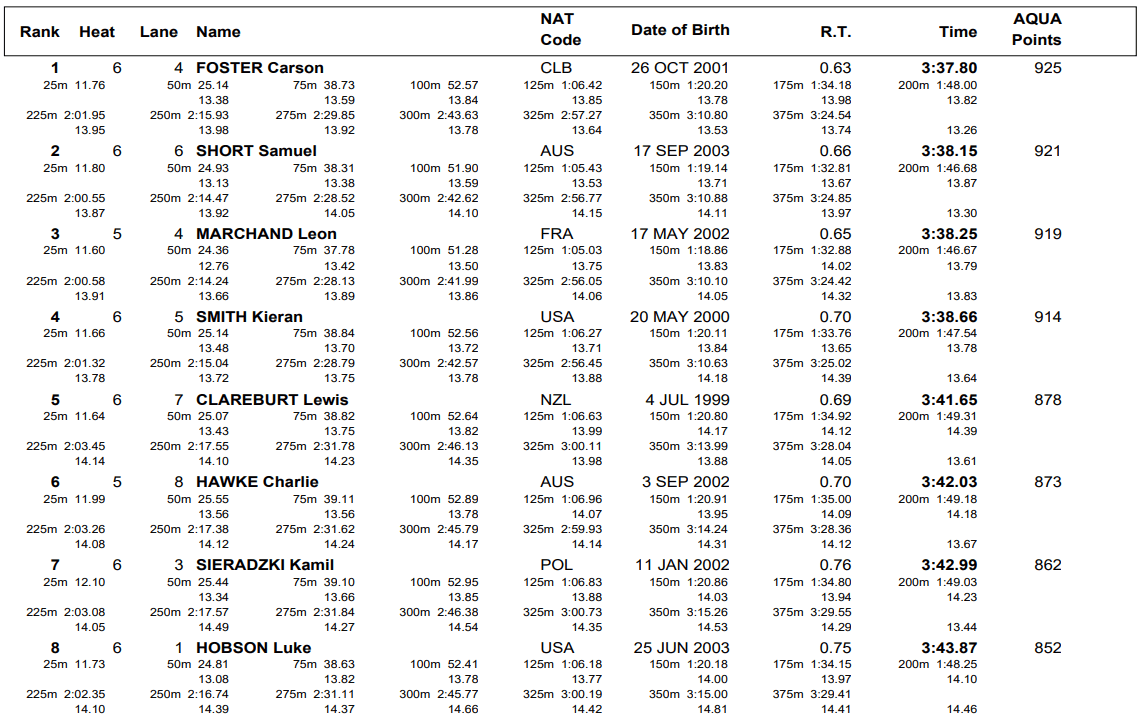
Women’s 50 Backstroke
Kaylee McKeown provided the first world-record scare of the World Cup circuit as she blasted ahead of the field in the women’s 50 back. McKeown had to deal with Katharine Berkoff, the American who won the long course world title in the event this summer, but McKeown’s superior underwater work put her ahead of the field halfway down the first length — and by the halfway point, she was ahead of world-record pace.
McKeown flipped in 12.57, quicker than the 12.63 that Regan Smith split on the way to her mark of 25.23 at last winter’s Short Course World Championships. McKeown was a touch slower than Smith on the back half as she finished in 25.42, just six hundredths off her own third-ranked personal best of 25.36. Australia finished 1-2 here as Mollie O’Callaghan clocked 25.80 to hold off Berkoff (25.82) by two hundredths. Just behind was Mexico’s Celia Pulido, as the Southern Illinois swimmer went 25.83.
Notably, Smith opted out of the 50 back at this competition, with plans to race the 200 butterfly later in the session.
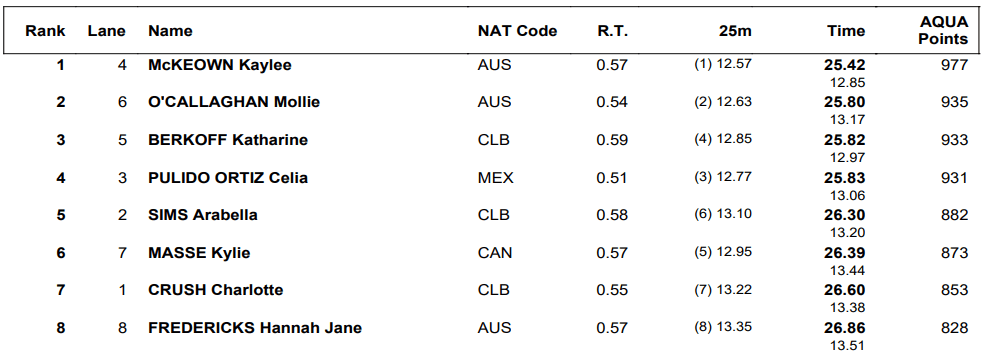
Men’s 200 Backstroke
Over the past two years, Hubert Kos has become the world’s dominant swimmer in the 200 backstroke, having collected a quartet of international gold medals. But in this World Cup meet, Kos got a reminder of the ridiculous talent of training partner Leon Marchand, particularly in short course. Backstroke is clearly Marchand’s weakest stroke, but his always-sensational underwaters gave Marchand a lead over Kos for the first 150 meters in the final.
But the Hungarian would not be denied in the race’s closing stages, at least in his signature event. Kos came back in 26.46 to out-split Marchand by almost a second, and that resulted in a winning time of 1:46.84. Kos was just over a second off the time of 1:45.65 he clocked for gold at last year’s Short Course World Championships, a meet in which he fell only two hundredths short of the world record.
Marchand grabbed second in 1:47.68, moving himself into the all-time top-10 in an event he hardly ever contests. Third went to Shaine Casas, another member of the pro group at the University of Texas. Casas was in third place for most of the race before he finished in 1:49.81. Following this result from Marchand, Casas dropped to No. 11 all-time in the race (best time of 1:48.01).
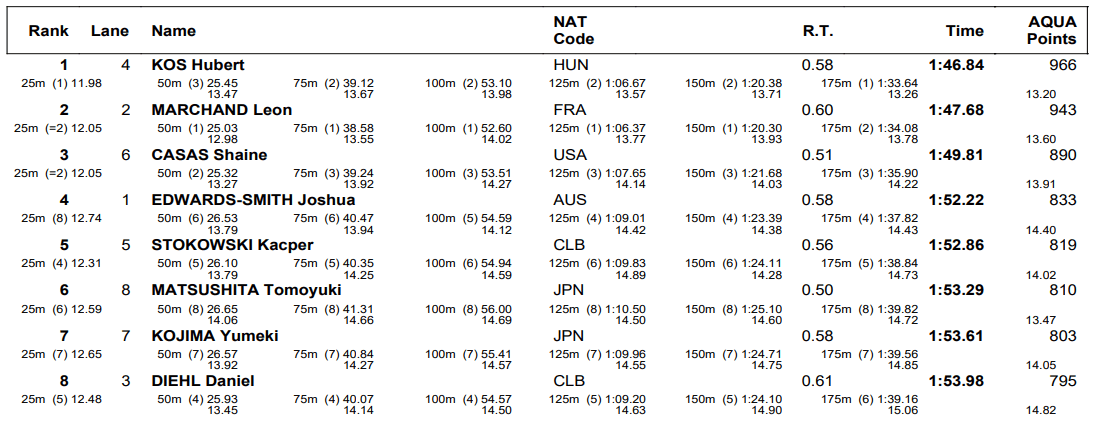
Men’s 100 Butterfly
Switzerland’s Noè Ponti utterly dominated the butterfly events in short course last fall, a run beginning on the World Cup circuit and culminating with a world title in world-record time in December. Now, Ponti is picking up where he left off as he returns to World Cup competition this month in North America.
Ponti had to face off with Ilya Kharun, the Canadian who swims at Arizona State University and won Olympic bronze medals in the 100 and 200 fly last year. Kharun excels on turns, but Ponti was even better over the back half of this showdown. A lead of five hundredths at the halfway point was more than three tenths at the 75-meter mark and then almost a half-second at the finish.
Ponti touched in 48.53, eight tenths off his own world record of 47.71 and narrowly behind his World Cup record of 48.40. Kharun claimed second in 49.02, knocking one hundredth from his lifetime best while remaining the No. 10 performer in history. Third went to South Africa’s Chad le Clos, the 33-year-old returning to major competition after a summer layoff with a time of 49.57.

Women’s 200 Breaststroke
No one can touch Kate Douglass in the 200 breast. She has now captured Olympic gold and world titles in both short course and long course in quick succession. The opening stop of the World Cup circuit saw Douglass build a lead of more than a second by the 75-meter mark, and she went on to out-pace the field by a whopping 3.83 seconds.
Last year, Douglass thrice set the world record in the event, going 2:14.16 and then 2:12.72 on the World Cup circuit and then 2:12.50 at the Short Course World Championships. This time, Douglass became the first swimmer to ever finish in 2:13 territory as she touched in 2:13.97, the third-best mark in history. No other swimmer has ever been that fast, with Rebecca Soni still ranking second all-time in 2:14.57.
The battle here came for second place, and that honor went to Germany’s Anna Elendt. The German who was the surprising world titlist in the 100 breast this year finished in 2:17.80, using a strong finish to pull ahead of South Africa’s Rebecca Meder. American Alex Walsh was just behind in 2:18.96.
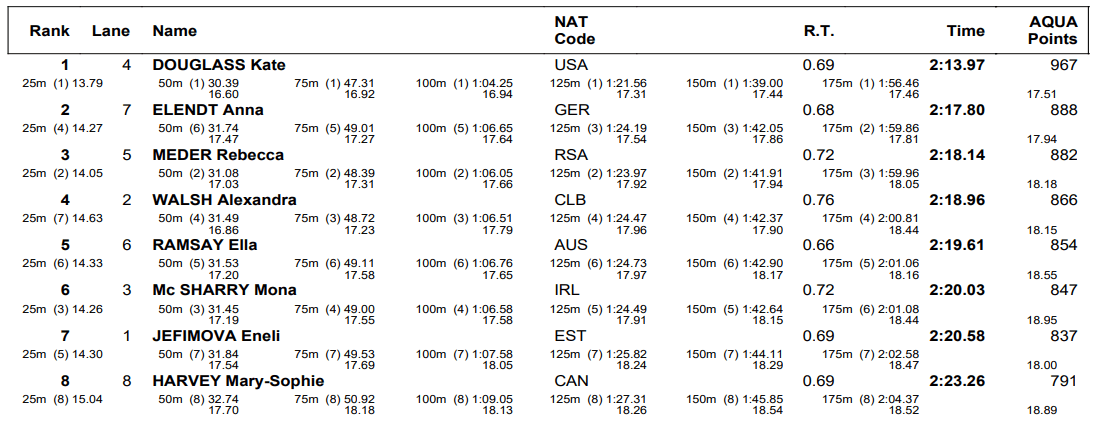
Men’s 100 Breaststroke
This was a field full of local connections, with five out of eight finalists training at Indiana University and a sixth, Jeremias Pock, competing for Division II program Indy. Van Mathias, the former Hoosier collegian who burst back into the domestic breaststroke picture this year, blasted the field on the third 25 to pull into a tie for first place, but he could not keep up with Caspar Corbeau down the stretch.
Corbeau, a Dutch international who has trained at both Texas and Indiana, is coming off a summer in which he won World Championships bronze in the 200 breast. He showed off that finishing speed here as he pulled into the wall in 56.67. Almost a half-second back was Ilya Shymanovich, the Belarusian world-record holder in this event who is competing as a neutral athlete here. Shymanovich finished in 57.18 to touch out Mathias (57.26), Pock (57.36) and Matheny (57.39).

Women’s 50 Freestyle
Poland’s Kasia Wasick is a 33-year-old Polish veteran who has won medals in the 50 free at five separate World Championships, two long course and three short course. She had to grapple with some accomplished sprinters in Carmel, three of whom were individual world champions in different events this summer in Singapore, but Wasick was the class of the field. She was the fastest swimmer going out (11.33) and coming home (11.96), and the result was a final time of 23.29.
Wasick finished two tenths ahead of Australia’s Alex Perkins, who emerged this year to win medals in the 50 and 100 fly at the World Championships. Perkins clocked 23.50 in this event. Mollie O’Callaghan, the world and Olympic champion in the 200 free, took third in 23.96. O’Callaghan earned her second podium finish of the night after previously getting second in the 50 back. O’Callaghan finished just ahead of compatriot Olivia Wunsch (24.01) and Dutch 100 free world champion Marrit Steenbergen (24.05).
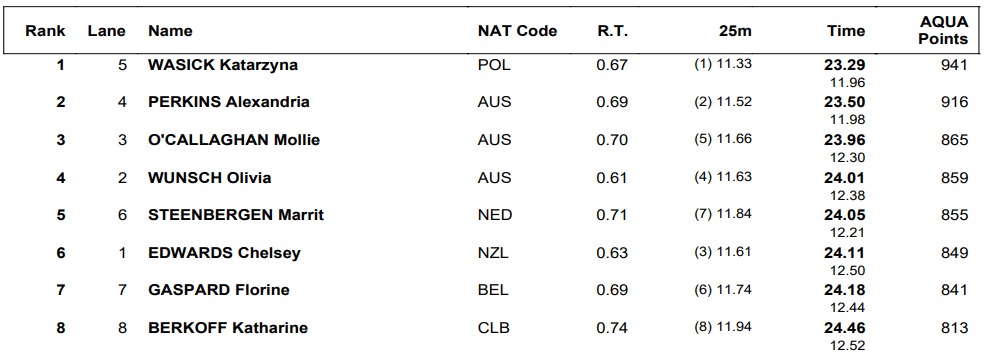
Men’s 50 Freestyle
A fingernail separated the top-three men in the 50 free, with two Americans who have dotted the international rankings in recent years touching out a Canadian better known for his butterfly abilities. Jack Alexy emerged at this year’s World Championships in Singapore with five medals, including silver in the 100 free and bronze in the 50 free, but in short course, he has to rely on closing speed to counter swimmers with more power off the walls. That gave Chris Guiliano an opportunity to go out fast and hang on for the win.
Guiliano finished five hundredths ahead of Alexy, 20.83 to 20.88, while Canada’s Ilya Kharun came back after taking second in the 100 fly to finish third in 20.89. Alexy turned in fifth place halfway through the race while Kharun was seventh before both surged on the way home. Those three men were the only swimmers to break 21 in this heat, with Trinidad and Tobago’s Dylan Carter ending up fourth (21.12).
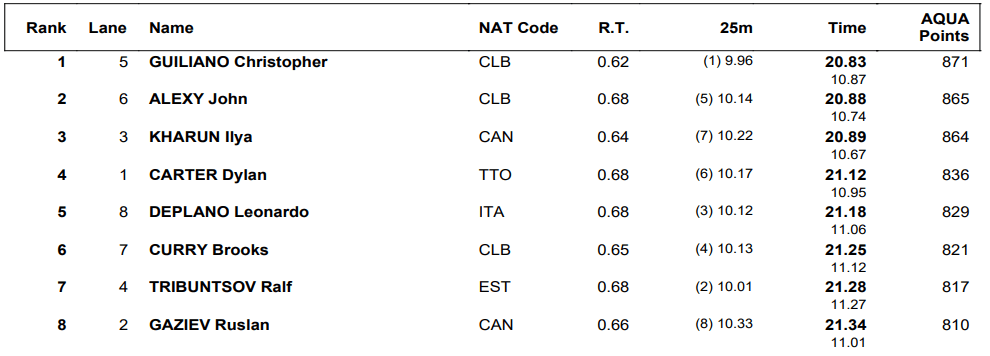
Women’s 100 IM
It has been just over a year since Gretchen Walsh first contested the 100 IM in short course meters, and she has absolutely put her stamp on the event. She broke the world record at a college dual meet and then twice more at the Short Course World Championships. She finished the season at 55.11, almost one-and-a-half seconds clear of the world record entering the season, the 56.51 posted by Katinka Hosszu in 2017.
Now, Walsh has put flexed again in an event perfectly suited to her skills. The former University of Virginia star blasted off each turn and briefly flirted with world-record pace. She ended up eight tenths behind in 55.91, but the performance was the third-quickest ever recorded and ahead of any other woman’s lifetime best. Walsh also broke the eight-year-old World Cup record also owned by Hosszu.
Second place went to Walsh’s training partner Kate Douglass in 56.34, also under the old World Cup record. Douglass swept the 100 IM at all three World Cup stops last season before taking silver behind Walsh at the Short Course World Championships. Here, Douglass swam a best time by 0.15 while reinforcing her status as the second-fastest swimmer in history. Third went to Belgium’s Roos Vanotterdijk in 57.44.

Men’s 100 IM
Friday evening’s session wrapped up with a final featuring five swimmers who have won world titles in at least one event at different points in their career. Of the group, only Noè Ponti has ever topped a 100 IM podium while Shaine Casas, Hubert Kos, Thomas Ceccon and Finlay Knox are better known for their strengths in longer distances or single strokes. In a tight final, Casas used a sizzling breaststroke leg to pull ahead of halfway-leader Kos and take the win in 50.86, moving himself into the all-time top-10 in the event.
Ponti placed second here in 51.13 while Knox and Kos tied for third in 51.29, just ahead of Ceccon (51.39) and top-qualifying American Grant House (51.45). Earlier in the session, Kos had taken first in the 200 back while Casas was third, and Ponti had finished first in the 100 fly earlier in the session.

